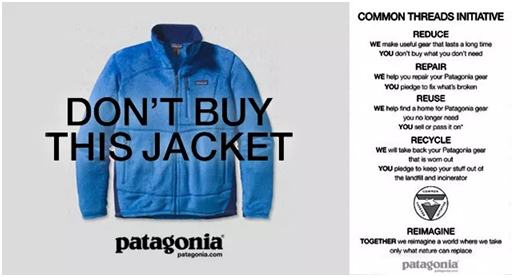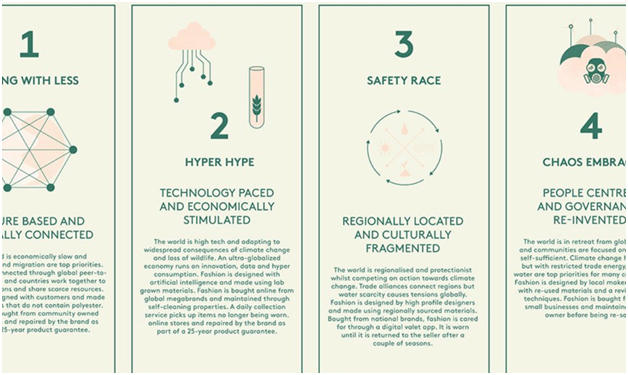
The sectors of luxury fashion and hospitality can wield massive influence over their customers, who in many cases can be fairly influential in their own capacities. How-ever both these industries rank high as significant contributors to unsustainable environmental practices.
Integrating responsible leadership in the sectors of fashion and luxury is crucial to a world where the use of luxury brands doesn’t come at the cost of our environment. SUMAS graduate programs in Sustainable Fashion Management and Sustainable Hospitality Management, offer cutting-edge curriculums aimed at doing just that:
- MBA in Sustainable Fashion Management
- MBA in Sustainable Hospitality Management
- MAM in Sustainable Fashion Management
- MAM in Sustainable Hospitality Management
Miruna Manole is an MA in Sustainable Luxury Management graduate from SUMAS currently working as a Non-Financial Analyst at The CSR Agency (Bucharest, Romania)
She’s also achieved a First Class Degree with Honours in BA Fashion Management & Marketing from the University for the Creative Arts, UK.
Here, she shares what motivates her towards positive change, her views on youth lead climate action and how to navigate things when it feels overwhelming.
Give us a little background on how or why you chose to pursue the MAM in Sustainable Luxury and what that is for people who aren't familiar with the field?
While working on my final major project for my bachelor, I did a lot of research and learned that the fashion industry is one of the most polluting industries in the world. Given the state of the planet, I realised that I could not create a business plan that would have a negative impact on the environment, hence I decided to focus on creating a sustainable business.
This is how I discovered it was a passion of mine, while the real need for this subject was confirmed by me winning the New Business Award at Graduate Fashion Week, in London.
I decided to further my knowledge on the subject and pursue the MAM in Sustainable Luxury at SUMAS.
As one of my professors at SUMAS put it, sustainable luxury is luxury that blends ethics and aesthetics.
Therefore, it is represented by beautiful, high-quality products that are created without compromising the health of the people and environment which contribute to their creation.
Can you tell us a little bit about where you're currently working and how sustainable luxury plays a role?
I currently have the role of Non-Financial Analyst at The CSR Agency, a consultancy company that focuses on sustainability. I work in sustainability reporting, so while the role is not strictly related to sustainable luxury, the courses I undertook while studying at SUMAS prepared me for the job, especially ‘Responsible Management’, where I learned about CSR (Corporate Social Responsibility) and CSR reporting.
You wouldn't have chosen this field if you didn't have hope for a positive long term outcome to the environmental crisis. Can you speak to what it is that gives you motivation and belief in change?
There is a quote by Barack Obama that really spoke to me when I first read it: “We are the first generation to feel the effect of climate change and the last generation who can do something about it.” The situation regarding climate change is serious and we have already started seeing the effects. It’s so serious in fact, that it has been suggested to use the term ‘climate emergency’.
However, scientists are telling us we still have time to act in order to make sure the future generations can enjoy good, healthy lives. I do have hope for a positive long term outcome, because we can already see people changing habits, companies responding to increasing pressure from consumers and governments coming together and collaborating for this cause.
My motivation is earth. We live on a beautiful planet and I hope we get to enjoy it for as long as possible.
What are your thoughts on the youth taking leadership on Climate Action?
I admire my peers and the younger generations for their determination. The youth is going to be most affected by the effects of the climate emergency, so I completely understand their anger, when they see the older generations not acting up fast enough and, in a way, stealing their chances of a good future life.
Were you involved in the initial or any following #ClimateStrikes and if so to what degree?
I have been following Greta Thunberg since the beginning of Fridays for Future and have attended the Climate Strike whenever possible, while I was living in Geneva. The turnout was impressive and we can already see that these actions are bringing positive results, including raising awareness.
What outcomes were you hoping for, specific immediate ones as well as ongoing ones?
The first result is raising awareness, which we still need to continue doing. Others include creating policies aiding the move to a more sustainable version of our society, regulating some of the largely used products and encouraging the shift towards alternatives, which can only happen with the support of the authorities.
Do you believe that youth-lead strikes are the most powerful way to motivate authorities to take notice on this issue?
Considering that Greta Thunberg started these strikes alone and is now giving speeches at important events regarding the issue, which comes as a result of millions of people joining her movement, we cannot deny that they are a powerful way to motivate authorities. In the end, authorities are there in the interest of their people and when they forget that, it is no surprise that people feel the need to remind them of this.
What is your take away advice to anyone who feels the climate crisis is an insurmountable issue?
My advice is to start small through individual positive changes. I believe this will inspire people, which in the end will put more pressure on authorities and companies. I also suggest reading positive news regarding the issue, which is increasingly present worldwide.
In the end, if we all try to lead better lives, no matter if the issue is indeed insurmountable, we can be satisfied that we have lead our lives being kind to each other and our home.
And I believe that is quite an important feeling to have.
If you are interested in studying in the area of sustainable tourism or sustainable fashion, take a look at some of our available courses and degrees.

 Log in with Facebook
Log in with Facebook 











